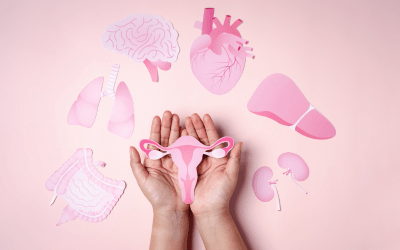Introduction
Irregular menstrual cycles can be a significant concern for many women, impacting both physical health and emotional well-being. At Jeevan Homoeopathic Clinic, we understand the importance of regular menstrual cycles and are dedicated to providing effective treatment for irregular periods. This blog will explore the common causes of irregular menstrual cycles, practical solutions, and optimal treatments.
5 Common Causes of Irregular Menstrual Cycles
Hormonal Imbalances

Hormones are vital for regulating the menstrual cycle. Conditions like Polycystic Ovary Syndrome (PCOS) and thyroid disorders can cause significant hormonal imbalances, leading to irregular periods. PCOS is characterized by an excess production of androgens, which can result in irregular or absent menstrual cycles. Thyroid disorders, including hyperthyroidism (overactive thyroid) and hypothyroidism (underactive thyroid), also disrupt the hormonal balance necessary for regular menstruation. Addressing these hormonal issues often involves medical interventions such as hormonal therapies or lifestyle changes to restore balance and regularity to the menstrual cycle.
Stress and Lifestyle Factors

High stress levels can significantly impact menstrual regularity. Stress triggers the release of cortisol, a hormone that can interfere with the production of reproductive hormones like estrogen and progesterone, leading to irregular periods. Additionally, lifestyle factors such as poor diet, insufficient exercise, and lack of sleep can contribute to menstrual irregularities. A diet high in processed foods and low in essential nutrients can disrupt hormonal balance. Regular physical activity and adequate sleep are crucial for maintaining hormonal health and menstrual regularity. Stress management techniques like yoga, meditation, and mindfulness can also help in regulating menstrual cycles.
Medical Conditions

Chronic medical conditions such as diabetes and celiac disease can have a profound impact on menstrual cycles. Diabetes can lead to insulin resistance, which affects hormone levels and menstrual regularity. Celiac disease, an autoimmune disorder triggered by gluten, can cause malabsorption of nutrients, leading to hormonal imbalances. Certain medications, including antidepressants and antipsychotics, can also disrupt menstrual cycles. Managing these underlying medical conditions effectively is crucial for maintaining regular menstrual periods. Regular medical check-ups and appropriate treatments for these conditions can help restore hormonal balance and menstrual regularity.
Weight Fluctuations

Body weight plays a significant role in menstrual health. Being underweight or overweight can lead to hormonal imbalances that disrupt menstrual cycles. Low body weight can result in decreased production of estrogen, leading to missed periods. Conversely, excess body weight can lead to increased estrogen production, which can also cause irregular cycles. Rapid weight loss or gain can have similar effects, disrupting the hormonal balance necessary for regular menstruation. Maintaining a stable, healthy weight through a balanced diet and regular exercise is essential for hormonal health and regular menstrual cycles.
Reproductive Health Issues

Various reproductive health issues can cause irregular menstrual cycles. Conditions such as fibroids, endometriosis, and pelvic inflammatory disease (PID) are common culprits. Fibroids are non-cancerous growths in the uterus that can cause heavy and irregular periods. Endometriosis, where tissue similar to the uterine lining grows outside the uterus, can lead to painful and irregular cycles. PID, an infection of the reproductive organs, can cause inflammation and menstrual irregularities. Proper diagnosis and treatment of these conditions are crucial for restoring regular menstrual cycles. Treatments may include medication, surgical interventions, and lifestyle changes tailored to the specific condition.
How Many Days is a Regular Period?
A regular menstrual cycle typically ranges from 21 to 35 days, with the menstrual period lasting between 2 to 7 days. However, variations are common, and what is regular for one woman may differ for another. Tracking menstrual cycles can help identify patterns and any irregularities that may need attention.
Addressing Irregular Periods: Practical Solutions
Addressing irregular periods often involves making lifestyle changes. Stress management techniques, such as yoga, meditation, and regular physical activity, can help regulate menstrual cycles. A balanced diet rich in nutrients, vitamins, and minerals is essential for hormonal health. Avoiding excessive caffeine and alcohol can also improve menstrual regularity. Incorporating these practical solutions into daily life can help manage irregular periods effectively.
Optimal Treatments for Menstrual Irregularities
Various treatments are available for menstrual irregularities, depending on the underlying cause. Medical treatments include hormonal therapies, such as birth control pills and hormone replacement therapy, which can help regulate menstrual cycles. Natural remedies, such as herbal supplements and dietary changes, can also be effective.
Homeopathic Treatment for Irregular Periods offers a holistic approach, addressing the root cause of the problem and restoring hormonal balance. Ayurvedic medicine for irregular periods includes remedies like Ashoka, Lodhra, and Shatavari, which are known for their effectiveness in regulating menstrual cycles. Consulting with a healthcare provider at Jeevan Homoeopathic Clinic can help determine the most suitable treatment options.
What to Do When Periods Are Absent?
Absent periods, known as amenorrhea, can be concerning. Potential reasons for missed periods include pregnancy, hormonal imbalances, excessive exercise, and stress. If periods are absent for more than three months, it’s essential to seek medical advice. Jeevan Homoeopathic Clinic offers comprehensive diagnostic services to identify the underlying cause and provide appropriate treatment. Treatments may include hormonal therapies, lifestyle changes, and addressing any underlying medical conditions.
Conclusion
Irregular menstrual cycles can be caused by various factors, including hormonal imbalances, stress, medical conditions, weight fluctuations, and reproductive health issues. Understanding these causes and implementing practical solutions can help manage irregular periods effectively. Jeevan Homoeopathic Clinic is committed to providing comprehensive treatment for irregular periods, ensuring women’s health and well-being. If you experience irregular menstrual cycles, consult with our healthcare providers to receive personalized care and treatment.

